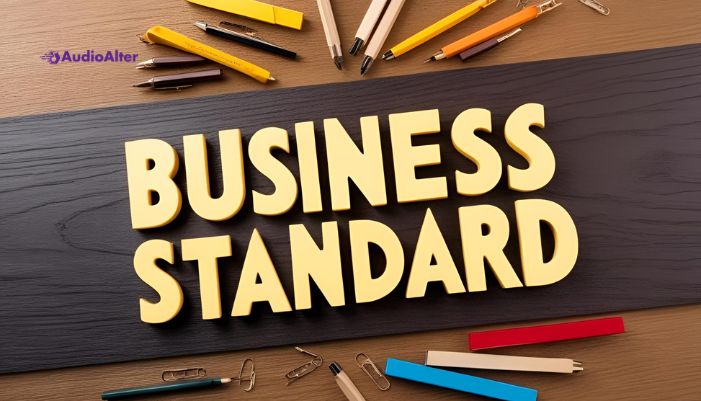A business standard is a rule or guide that companies follow. These standards help keep work clear, fair, and smooth. Think of them like a playbook everyone uses to win the same game. From customer service to product quality, business standards cover everything.
Why Are Business Standards Important?
Business standards do more than keep things neat. They:
- Build trust with customers
- Help teams work better
- Keep companies safe from legal trouble
- Show what quality looks like
When a company follows strong standards, people notice. It sends a message: “We know what we’re doing.”
Common Areas Where Standards Apply
1. Product Quality
Standards make sure products are safe and work well. For example, a food company must meet health rules before selling anything.
2. Customer Service
Many businesses use service guidelines to keep support quick, friendly, and helpful.
3. Workplace Safety
Health and safety rules protect workers. They reduce accidents and help people feel secure at work.
4. Data Protection
Digital rules keep customer information safe. This is more important than ever in 2025.
5. Business Ethics
Standards help companies act in fair and honest ways. They guide choices in tough times.
How Are Business Standards Made?
Some standards are made by the government. Others come from groups like the ISO (International Organization for Standardization). A few are made by the company itself.
Government Standards
These are laws or rules companies must follow. For example, banks must follow rules about how they handle money.
Industry Standards
Many industries have their own guides. For example:
- The food industry follows safety standards.
- Tech firms use data security rules.
Company Standards
Businesses also make their own internal guides. These cover things like:
- How to talk to customers
- How to dress at work
- What to do in case of a problem
Benefits of Following Business Standards
1. Better Results
When everyone follows the same guide, it’s easier to get things right.
2. Happy Customers
Customers trust businesses that stay consistent and fair.
3. Safer Teams
Clear rules make work safer for everyone.
4. Fewer Mistakes
Guidelines help spot problems early and fix them fast.
5. Good Reputation
Standards show people you’re serious and professional.
Real-World Example: A Clothing Store
Let’s say a local clothing store sets its own business standards. These might include:
- Greet every customer within 10 seconds
- Always offer to help
- Make returns easy
Because the team follows these steps, customers leave happy and come back often. This simple set of rules helps the store grow.
Expert Insight
Sarah Malik, a retail business coach, says:
“A clear business standard gives your team confidence. It’s like a map that shows them how to treat people, handle issues, and get results. Without it, you’re just guessing.”
How to Set Business Standards for Your Company
Here’s how you can make clear and strong standards:
- Start With Your Goals
- What do you want to achieve?
- What values matter most to your company?
- Write Down Your Rules
- Make them simple and clear
- Use short sentences and everyday words
- Train Your Team
- Show your staff how to follow the rules
- Give real examples and practice situations
- Update Often
- Check your standards every few months
- Make changes when needed
Questions About Business Standards
What Makes a Good Business Standard?
- It’s simple to understand
- It helps people act in the right way
- It supports your company’s goals
Are Business Standards Legally Required?
Some are. Laws often cover things like safety and privacy. Other standards are optional but helpful.
Who Sets Business Standards?
They can be set by:
- The government
- Industry groups
- The company itself
How Business Standards Help in 2025
In 2025, business is moving fast. Technology, global trade, and new laws are changing things. Standards help companies:
- Keep up with change
- Protect customer trust
- Train new workers quickly
Examples of Modern Business Standards
- Using clear return policies in online stores
- Having data privacy rules for mobile apps
- Offering equal pay across all roles
Tips to Keep Your Business Standards Strong
- Use short and simple language
- Share them often with your team
- Check that everyone understands
- Fix unclear or outdated rules
Common Business Standard Mistakes
Avoid these pitfalls:
- Making rules too complex
- Not updating for new problems
- Ignoring feedback from workers
FAQs About Business Standard
Why are business standards important?
They help build trust, improve results, and make work safer and easier.
Who uses business standards?
Every business—from shops to tech firms—can use standards to do better work.
Can small businesses have standards?
Yes! Even simple rules make a big difference for small teams.
How often should standards be updated?
Every few months or when something changes.
Final Thoughts
A business standard is more than just a rule. It’s a promise. It says your company cares about doing things right. In today’s world, that means everything.
Whether you run a large firm or a small shop, clear standards help you grow, improve, and earn trust. They show your team how to act and show the world what you stand for.
Start with small, simple rules. Teach them well. Then keep improving. That’s the real business standard of success.



